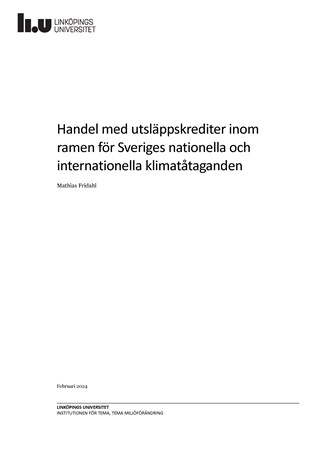LUNETs studies the technical and economic possibilities of using NETs and primarily the methods bioenergy with carbon capture and storage (BECCS) and biochar including their political and scientific contexts. BECCS means that carbon dioxide is separated from biomass that is processed at large scale facilities, for example at pulp and paper mills and combined heat and power plants. The carbon dioxide is then transported to suitable geological formations where it is deposited. A net negative effect could be achieved as the corresponding amount of processed biomass is regrown. Biochar is produced through slow pyrolysis of biomass and can then be placed on farmland to simultaneously bind carbon and improve soil quality. There are major knowledge gaps and lack of experience regarding both methods, but as the climate goals have become more ambitious, these methods have become more relevant in both political and scientific contexts.
LUNETs comprises several projects funded by the Swedish Research Council, Formas, the Swedish Energy Agency, the Swedish Environmental Protection Agency and SIDA and includes Linköping University, KTH Royal Institute of Technology and the University of Dar es Salaam in Tanzania. The projects take different perspectives to jointly investigate the conditions for developing and implementing NETs in different geographical, regulatory, institutional and national contexts. Currently, Sweden, the Nordic countries, Europe and Tanzania are being investigated as cases. We are also studying how knowledge of different methods is constructed through scientific models, Integrated Assessment Models (IAMs), and the scientific debate on BECCS. LUNETs contributes with an understanding of how current structures and policies promote or limit the development of the methods, how this development could be supported in a constructive way and with critical perspectives on the global and national potential of the techniques. In addition, the projects engage various societal actors through ongoing dialogues to raise important issues and to include many perspectives on the methods at an early stage.
The conditions for BECCS and biochar
By studying the different geographical contexts with varying theoretical potential for implementing/establishing BECCS, we can contribute to the ongoing discussions of its possible contribution to climate policy in a global, regional and national context. Not least, it is important to nuance and embody the global perspective on negative emission technologies so often presented in the models relied upon by the work of the IPCC.
In a global comparison, the Nordic countries have good preconditions to use large scale BECCS. Extensive forest cover, a modern and internationally competitive forest industry, many large point sources with biogenic carbon dioxide, potential to store carbon dioxide locally, along with national goals to reach climate neutrality or to achieve net negative emissions. Despite the good prerequisites, there are many challenges. For example, policy instruments and economic incentives to implement BECCS in industry are absent, infrastructure for transport is lacking, the technology is relatively unproven on a large scale, and industry interest is relatively low, with a few exceptions. The project team is mapping large point sources, evaluating possible policy instruments and examining perspectives on BECCS at individual companies including the industries concerned and at the forefront of technology development.
Several models identify potential for BECCS in forested developing countries, for example Tanzania. In a sub-project, we have concluded that the potential is negligible, but that biochar which is technically less complicated could result in immediate and tangible benefits for local communities and contribute to international climate efforts. We analyse how international support could contribute to biochar’s development and evaluate lessons learned from already completed biochar projects. Biochar field trials will be initiated in Tanzania in the coming year.














